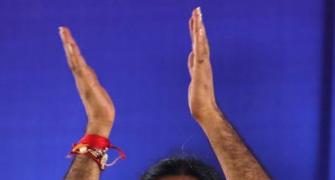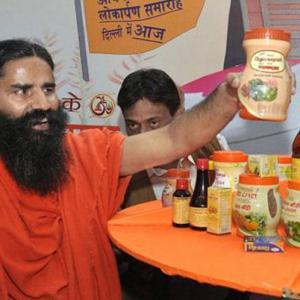Baba businesses are sprucing up their act as they expand product portfolios and enhance brand image

Rising popularity and competitive intensity from the likes of Patanjali are emerging threats to listed fast-moving consumer goods (FMCG) companies.
The actual impact will depend on factors such as market position, extent of product or category overlap, each company’s strategy on pricing, product and promotions as well as on the aggression of the Guru businesses.
While Patanjali is strong in three segments at present - cow’s ghee, toothpaste and hair oils - companies and analysts are taking note of the emerging scenario. Smaller companies with insignificant presence in certain categories, however, are more at risk, analysts say.
“New product trials have boosted Patanjali’s growth; trends in repeat purchases will be key. We see dominant players in a segment to be better placed than others,” says Aditya Mathur, FMCG analyst at Citigroup.
Nevertheless, there is a need for incumbents to up the ante. The reasons are there to see. While Colgate has maintained its leadership position over the years despite phases of rising competition, it recently lost some market share.
Also, though Patanjali has a minuscule market share (about 1.9 per cent), increasing consumer preference towards health-positioned toothpastes is a risk.
Dabur’s Red toothpaste enjoys first-mover advantage in this segment and is growing at a healthy clip. “Today, the brand controls nearly seven per cent market share, from five per cent two years ago,” says Lalit Malik, chief financial officer, Dabur India.
However, Dabur, incidentally, has the highest product overlap with Patanjali and is already fighting it in the honey segment where the latter has priced its products about 40 per cent lower. Its Chyawanprash, digestives and OTC ethicals and juices could also see pressure. Dabur, however, plans to launch premium, value-added products to grow market share of its honey products.
In hair oils, while Dabur Amla has so far retained market share, companies like Emami and Bajaj Corp sound confident. Sumit Malhotra, managing director, Bajaj Corp, says, “We have grown by seven per cent in January, higher than the industry growth of three per cent.”
Emami’s Kesh King, too, continues to do well. Emami’s Zandu portfolio of balms competes with Patanjali product but here, too, the management insists the Zandu portfolio is growing its market share.
ITC and Godrej Consumer Products (GCPL) have fewer segments where Patanjali is competing, and are unlikely to feel the heat, say analysts.
For Nestle analysts at IIFL believe Patanjali will not have a major impact in the instant noodles category but its foray into cow-based milk powder could be a risk.
While incumbents enjoy strong cash flows and brand equity with a robust execution track record, too, and are well-placed to compete efficiently through innovations, advertising and promotion, what could emerge as a real worry is that the baba businesses are sprucing up their act as they expand product portfolios and enhance brand image.
They are also working on expanding their distribution reach and going online. Many already have large followings and hence, captive customers.
Photograph: Reuters










